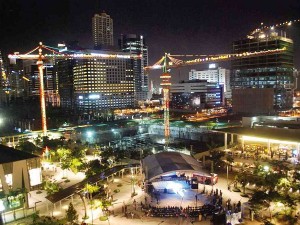
The Makati City government, not Taguig City, has jurisdiction over Fort Andres Bonifacio, home to the posh commercial and residential Bonifacio Global City, according to a ruling by the Court of Appeals Sixth Division.
MANILA, Philippines—The Makati City government, not Taguig City, has jurisdiction over Fort Andres Bonifacio, home to the posh commercial and residential Bonifacio Global City.
This was declared by the Court of Appeals Sixth Division in a ruling that seeks to end a 20-year territorial dispute between neighbors Makati City and Taguig City over the more than 729-hectare Fort Bonifacio, formerly called Fort William McKinley.
In a 37-page ruling issued on July 30 by Associate Justice Marlene Gonzales-Sison, the court granted Makati’s petition questioning a Pasig Regional Trial Court’s decision on July 8, 2011, and order on Dec. 19, 2011, and set these aside. (The lower court ruling declared invalid and unconstitutional two presidential proclamations that showed Makati had jurisdiction over the disputed area.)
The appellate court then rendered the following decision:
— Ordered Taguig to immediately cease and desist from exercising jurisdiction within the disputed area which is Fort Bonifacio and “return the same to Makati.”
— Dismissed Taguig’s complaint against Makati filed in 1993 in a Pasig City Regional Trial Court from exercising jurisdiction over the disputed area for lack of merit.
— Confirmed that the disputed area covering the “embo” barangays (Cembo, South Cembo, East Rembo, West Rembo, Comembo, Pembo and Pitogo) and Inner Fort barangays (Barangay Post Proper Northside and Barangay Post Proper Southside) in Fort Bonifacio “are within the territorial jurisdiction of Makati City.”
— Lifted the preliminary injunction issued by the lower court on July 15, 1994, as modified in the Sept. 11, 1995, resolution.
This ruling prevented Makati from exercising jurisdiction outside the enlisted men’s barrio barangays, particularly where the military camp proper was located, or what is called the Inner Fort.
— Declared constitutional and valid Presidential Proclamation Nos. 2475 and 518, which reinforced Makati’s ownership of Fort Bonifacio.
Proclamation No. 2475, issued by then President Ferdinand Marcos on Jan. 7, 1986, disregarded the claim of Taguig over Fort Bonifacio, saying that this fell under Makati’s jurisdiction. On the other hand, Proclamation No. 518 said the tracts of land in Fort Bonifacio were situated in Makati.
More credible
In its ruling, the appellate court found more credible the claim of Makati over Taguig.
“We believe, however, that contrary to the findings of the lower court as between pieces of evidence presented, Taguig was not able to prove this greater weight of evidence to merit a favorable decision,” the court said.
These included the evidence presented by Makati and its claim that Fort McKinley lay outside the tract of land claimed by Taguig to be situated in Taguig, Pasay and Parañaque.
“More telling is that even prior to the filing of the complaint by Taguig in 1993, Presidential Proclamation Nos. 2475 and 518 recognized that the ‘embo’ barangays are in fact within Makati’s jurisdiction,” it said.
The court disagreed with the lower court’s contention that both proclamations had altered municipal boundaries and transferred areas from Taguig to Makati without the benefit of plebiscites.
Censuses
But the appellate court said the censuses since 1970 of the seven military barangays had indicated that these were under Makati’s jurisdiction and that residents there were voting in national and local elections as Makati voters.
“Hence, Presidential Proclamation Nos. 2475 and 518 did not alter boundaries but instead confirmed that said area is under the jurisdiction of Makati,” the appellate court said.
It also noted that it took Taguig until 1993 to complain against Makati’s jurisdiction over the disputed area when the two proclamations were issued in 1986 and 1990, respectively.
Taguig’s delayed claim
The appellate court said the Supreme Court held that “considerable delay in asserting one’s right before a court of justice is strongly persuasive of the lack of merit of his claim, since it is human nature for a person to enforce his right when same is threatened or invaded.”
“In fine, by upholding the validity of (the two proclamations), the claim of Makati over the disputed area becomes undisputed, hence, necessarily, the claim of Taguig must fail,” the appellate court said.
The ruling was concurred in by Associate Justices Hakim Abdulwahid and Edwin Sorongan.
Related Story:
What Went Before: Disputes over Fort Bonifacio